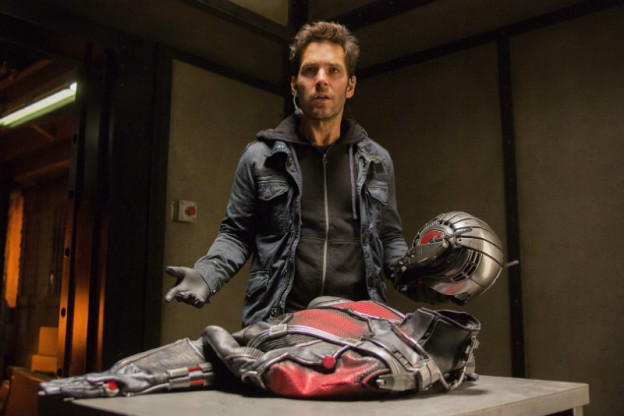After seven years of consecutive hits, Marvel Studios has essentially proved that it can turn just about any of its comic book titles into a cash cow at the box office. After all, once you’ve led a gun-toting raccoon to more than $700 million worldwide, it’s all downfall from there. Truly, Ant-Man doesn’t feel nearly as risky a big-screen proposition as it once did, and as it turns out, the film isn’t nearly as new and different as fans would hope.
Scott Lang (Paul Rudd) is a just-released ex-con in search of a purpose and a way to win back his daughter. Hank Pym (Michael Douglas, lending the same kind of gravitas here as Robert Redford did in Captain America: The Winter Soldier) is a washed-up scientific genius looking for someone to harness his shrinking technology to keep the power from getting into the wrong hands. You know where this is going.
While the film’s self-aware marketing campaign paints the film with the same quirky brush as Guardians of the Galaxy, Ant-Man isn’t nearly as tongue-in-cheek as some might expect. It’s easy to see where the wry humor and distinctive visual flair of writer/director Edgar Wright – who dropped out of Ant-Man after developing it with Marvel for over a decade – might have bolstered the film’s chances to transcend its genre into something truly fresh.
As it stands, Ant-Man gives audiences a solid, though unspectacular, origin story for yet another of Marvel’s heroes. Rudd is likeable as always and shares strong chemistry with Douglas and Evangeline Lilly (playing Pym’s daughter Hope van Dyne). Corey Stoll does the best he can with a one-dimensional villain character that plays like a younger rehash of Jeff Bridges’ Obadiah Stane.
Case in point, much of the film relies on familiar storytelling conventions and accessible emotional touchstones. However, the parts of Ant-Man that leave the “human story” behind to focus on Lang’s burgeoning control of his newfound power and connection to his insect allies are certainly the highlights. None of the Marvel films have ever really placed a priority on emotional stakes (we all know how these films operate by now), but the sharp, well-paced action sequences and breathtaking visual approach to Ant-Man’s shrinking powers provide sweet relief… before returning to the paint-by-numbers corporate venom and family drama.
Still, even if Ant-Man doesn’t aspire to be much more than your typical Marvel release, the film does mark some significant steps forward for the universe in which these heroes live. In fact, a nice chunk of its plot fills in some gaps for the early days of S.H.I.E.L.D. and exactly how Pym connects to the organization (and the superhero team it helped create). When one of the Avengers does appear midway through the film, it actually happens in a surprising way, culminating in a standout sequence that could indirectly lead to at least 2 new heroes joining the roster down the line, while serving as a slick bridge between Avengers: Age of Ultron and next year’s Captain America: Civil War.
Kudos to Marvel for banking on one of their riskiest projects yet, but Ant-Man still falls prey to the studio’s formulaic trappings and – aside from those exhilarating shrinking scenes – feels like a remix of the first Iron Man, Ocean’s Eleven and (I’m just gonna say it) Honey, I Shrunk the Kids (anyone remember the ill-fated Antie?). It’s a fun ride buoyed by some clever action beats and Rudd’s natural charm, but the conclusion of Phase Two of the Marvel Cinematic Universe doesn’t exactly pack the same decisive punch as its Phase One closer, The Avengers.



I used to like Ant-Man. But when I watched it for the second time. I began to realize that it’s just another generic, mediocre MCU film.